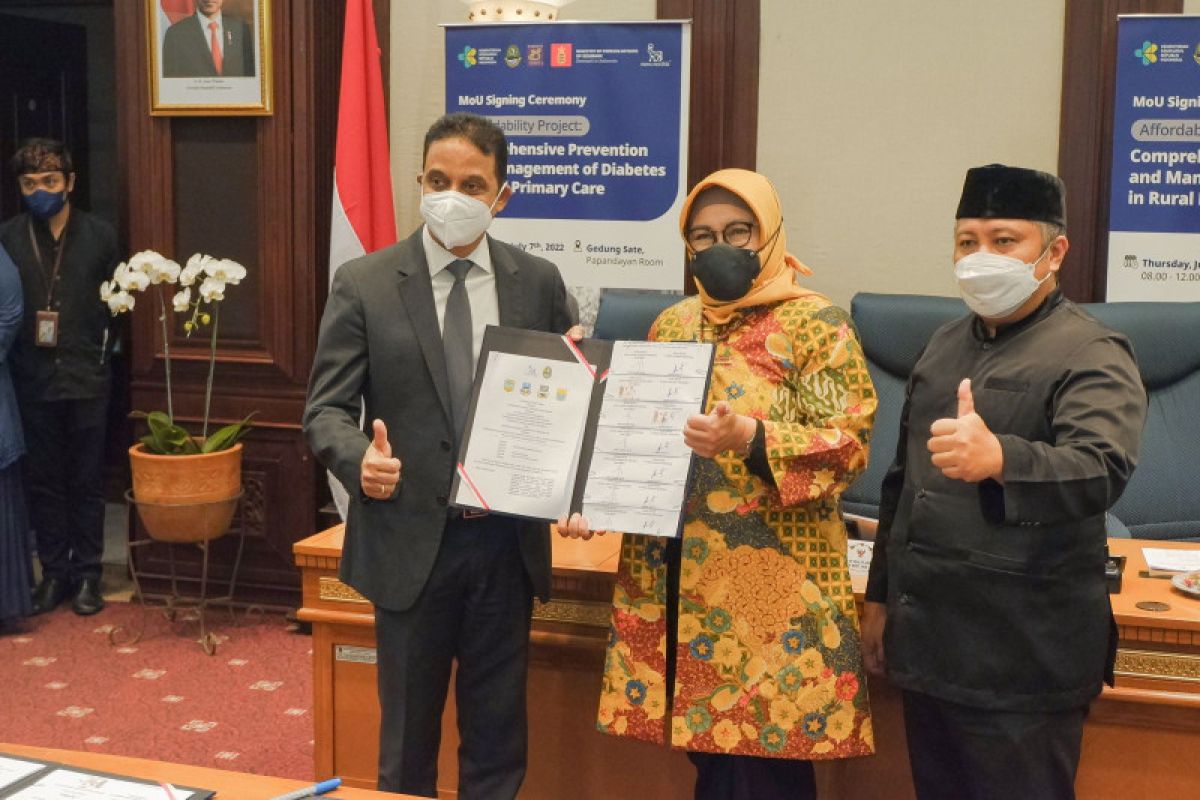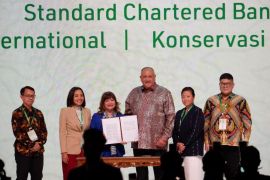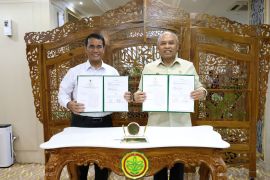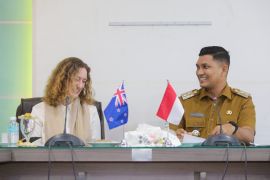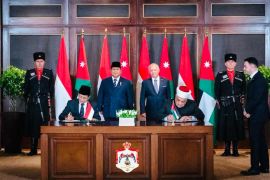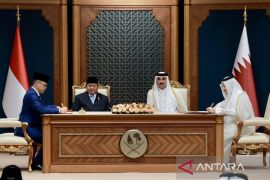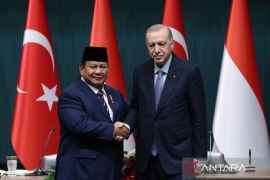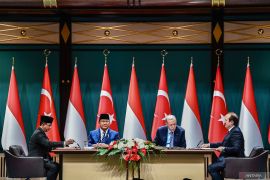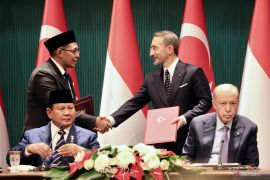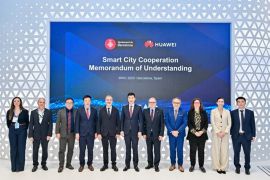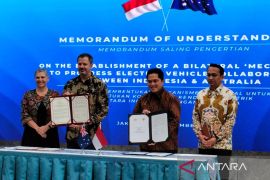The Affordability Project aims to transform primary health care in remote and very remote areas so that they can comprehensively prevent and treat diabetes
Jakarta (ANTARA) – Novo Nordisk Indonesia and the West Java provincial government signed a memorandum of understanding (MoU) for the Affordability Project, a joint effort to improve access to diabetes care for vulnerable groups in remote and very remote areas through the transformation of primary care facilities.
To this day, diabetes is still one of the most urgent health issues in Indonesia as it results in high rates of sufferers and deaths. According to data from the International Diabetes Federation (IDF), the number of people with diabetes continues to increase from 10.7 million in 2019 to 19.5 million in 2021, bringing Indonesia to fifth place in the world, up from seventh in 2019. From 19.5 million people with diabetes, it is estimated that 50 percent of them have not been diagnosed, only 13 percent of patients who have been diagnosed are undergoing treatment through the National Health Insurance (JKN), and only 1.2 percent of cases are well controlled.
People with diabetes require long-term treatment and a comprehensive approach to improve their quality of life. However, to answer this need, there are still many challenges faced in remote and very remote areas, such as limited infrastructure, resources, and competence of health workers. This causes many diabetes cases in remote and very remote areas to be referred to large hospitals, but due to geographical issues, not all patients are willing and able to seek treatment at the hospital. Coupled with limited knowledge about how to prevent and treat diabetes, many cases cannot be controlled properly.
To address this problem, the transformation of primary health care is considered as one of the best ways to help people in remote and very remote areas prevent and manage diabetes.
As part of its social responsibility strategy to tackle diabetes globally, Novo Nordisk is bringing the Affordability Project to Indonesia – a concerted effort to remove barriers to access to diabetes services in remote and very remote areas. In Indonesia, the Affordability Project aims to: (1) strengthen the integrated health counseling post (Posbindu) program to increase understanding of diabetes and screening for non-communicable disease risk factors; and (2) strengthen the capacity and capability of primary health services in optimal diabetes management. All of these goals will be achieved by increasing the capacity and capability of Health workers and providing equipment to monitor and manage blood sugar, including providing insulin, which is currently only available in hospitals.
For the pilot project, the Affordability Project targets 46 primary health facilities in four regencies in West Java: Cianjur, Garut, Tasikmalaya, and West Bandung.
Responding to the MoU signing, Danish Ambassador to Indonesia H.E. Lars Bo Larsen expressed his joy at the start of the Affordability Project, “The Affordability Project is a continuation of the government to-government memorandum of understanding (G2G MoU) signed by the health ministers of the two countries, Indonesia and Denmark, a year ago. I'm really excited that we're now ready to launch community-specific concrete actions.
“Basically, we all recognize that controlling healthcare costs in the national health system is a huge challenge. And one of the burdens is diabetes, one of the nine diseases that are a priority for the Indonesian government. The best way to address this challenge is to increase awareness and prevention, not just address the implications of diabetes. I am honored and proud that we can partner with Novo Nordisk to jointly improve diabetes screening in West Java.'
Meanwhile, Health Ministry Director of Primary Health Services dr. Yanti Herman, SH, M.H.Kes, added, “The Health Ministry welcomes the cooperation in Affordability Project activities offered by the Danish government and Novo Nordisk. Health workers will receive training in diabetes management, assistance in activities, fulfillment of equipment and insulin as needed. We hope that the signing of today's cooperation will be the beginning of a good commitment from various parties so that it can provide maximum benefits for the people of West Java and can be replicated for the benefit of the Indonesian people."
This program is also in line with the 2021-2024 National Health Strategy, in particular the pillars of Primary Service Transformation: 1) Public education, 2) Primary prevention, 3) Secondary prevention, and 4) Capacity and capability building of primary services.
Health Ministry Acting Director of Prevention and Control of Non-Communicable Diseases dr. Elvieda Sariwati, M.Epid said, “The Affordability Project will strengthen diabetes management programs based on minimum service standards (MSS) starting from early detection for productive age and the elderly, to diabetes management. Handling diabetes with controlled blood sugar is also included in the Health Ministry's Strategic Plan (Renstra). Therefore, this activity is expected to help in this control.”
Regarding the target, West Java Health Agency Chairwoman dr. R. Nina Susana Dewi, Sp.PK (K)., M.Kes., MMRS explained, “Diabetes can cause various complications. Proper control and treatment will reduce the impact of death. The prevalence of diabetes in West Java according to the 2018 Basic Health Research (Riskesdas) is 1.74 percent or about 570,611 people. It takes collaboration and hard work from field officers, to get data and how we can re-identify patients who have been treated at community health centers (puskesmas)."
The Affordability Project has set a target for diabetes screening of 40 percent of the adult population, which is about 230,000 people, and will provide comprehensive care for 6,000 patients.
Indonesian Endocrinology Association Board (PP PERKENI) Chairman Prof. Dr. dr. Ketut Suastika, Sp.PD, KEMD, FINASIM, also has the same view, he said, “Diabetes is a very complex and progressive disease that can cause disability and death, and at a very large cost, both for the community and the government. The Affordability Project is a significant first step. PERKENI will support this activity and hopefully this activity will give maximum results.”
Increasing the capacity of general practitioners, particularly in primary care centers, is in line with the National Health Transformation Strategy. As the front line of primary health care, increasing the capacity of general practitioners is very important. In accordance with the National Guidelines for Medical Services (PNPK), general practitioners are allowed to initiate insulin. This can provide faster access to diabetes management for patients.
Novo Nordisk Indonesia Vice President & General Manager Anand Shetty explained that Novo Nordisk is committed to providing access for vulnerable diabetic patients in various countries, including Indonesia, and accelerating the diabetes prevention process. “We are very proud to be a strategic partner of the Indonesian and Danish governments in various health initiatives in Indonesia. Novo Nordisk has been trying to drive change in diabetes and other chronic diseases for nearly a hundred years. The Affordability Project is one example where we will provide comprehensive treatment for diabetes.
“We also thank PERKENI, which has jointly developed a curriculum for health workers at puskesmas. We will cooperate with all relevant parties and provide all support and ensure this activity runs well for the benefit of thousands of people with diabetes. We look forward to continuing the Affordability Project so that we can continue to drive change in diabetes management.”
Reporter: PR Wire
Editor: PR Wire
Copyright © ANTARA 2022
